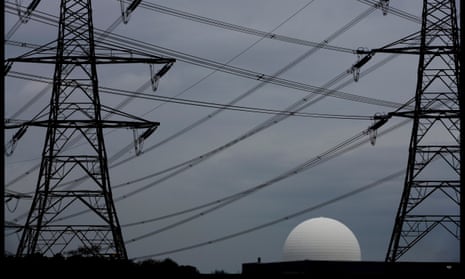Labour’s Keir Starmer has urged the government to keep Britain in the Euratom treaty that governs the movement of nuclear materials – and drop its red line on the future role of the European court of justice or risk defeat in the House of Commons.
The shadow Brexit secretary vowed to work with MPs across the political spectrum, including a growing number of Conservative rebels, to protect the UK’s place in the European atomic energy community.
“It’s increasingly clear that the government acted recklessly by giving up on membership of Euratom. As with so many aspects of the prime minister’s Brexit strategy, she has let ideological obsessions – in this case preventing any future role for the European court of justice – take priority over safeguarding jobs and the economy,” said Starmer, who said there were 78,000 UK jobs in the nuclear industry.
With at least nine Tory MPs signalling a willingness to line up with Labour and the Lib Dems, it could be difficult for May to win a vote on the issue later this year, even with the support of the Democratic Unionists.
Ed Vaizey, a former Tory minister, joined forces with Labour MP Rachel Reeves over the weekend to warn that the treaty was vital to protect the nuclear power industry in the UK.
Euratom is the body that coordinates Europe’s civil nuclear energy industry. It was born in parallel with the birth of the European economic community in 1957, and is part of a separate treaty to that which created the European Union. As a result the UK had to serve notice to quit it separately.
It has emerged that ministers are considering trying to secure “associate membership” of the grouping, similar to that held by Switzerland, in the face of the possible rebellion. Another option on the table is paying money to an international agency to set up an independent arrangement.
However, all countries that currently have full access to Euratom do have to accept that the ECJ has a role in dealing with relevant disputes, something that Theresa May has said she will not accept.
Questions were also raised about the impact that a Euratom exit could have on cancer patients, amid warnings that thousands could face delays to treatment if there are difficulties moving radioactive material around.
Dr Nicola Strickland, president of the Royal College of Radiologists, told the Evening Standard she feared the risk of “Brexatom” could threaten the supply of radioactive isotopes, used in scans and treatment.
The newspaper, edited by the former chancellor George Osborne, carried a story on its front page with the headline: “Cancer patients in Brexit scare.”
Labour’s shadow health secretary Jonathan Ashworth has demanded that his counterpart in government, Jeremy Hunt, urgently update parliament about the possible impact for patients.
The Labour frontbencher has sent a letter asking the Department of Health to publish any analysis it has carried out on the issue, and questioning what consultations were carried out before a decision was reached on exiting Euratom.
“The NHS is already under huge pressure and struggling to cope in the face of underfunding by this government. Demand for cancer services is rising and key cancer targets have been missed in recent months. Clearly this additional threat to stable supply chains has the potential to make a difficult situation much worse,” Ashworth wrote.
He also called on ministers to release the legal advice that said it was necessary to leave Euratom as part of Brexit.
The pressure has been mounting since May included leaving Euratom in her article 50 letter to the European council president, Donald Tusk.
Critics believe May has created the problem by insisting that the UK cannot remain under the jurisdiction of the European court of justice.
However, a senior Whitehall source told the Guardian that the government had included that line because of a belief that the UK had no choice. They said that “both the UK government and the European commission thought it was a legal necessity” to leave Euratom as part of Brexit.
However, the source said significant work was under way to ensure that Britain had the “same outcomes” as currently enjoyed within the grouping, and admitted that country membership was being considered. “We will not be marking our own homework when it comes to nuclear safety,” he added.
A source from the European commission confirmed that, legally speaking, the UK would have to leave Euratom as part of Brexit. All the members of Euratom are inside the EU, although Switzerland is an equal partner through associate membership.
Reeves, who is running to become chair of the business select committee in parliament, said: “MPs from across the political spectrum are clearly very worried about the prospect of leaving Euratom and ideology getting ahead of sensible politics.
“It is time for the government to rethink this. Nobody voted to leave the EU to come out of Euratom, and no one would think the government was going soft on Brexit if they rowed back on this.”
Dame Sue Ion, honorary president of the National Skills Academy for Nuclear and former chair of the Nuclear Innovation and Research Advisory Board, said: “Associate membership is better than nothing, but it all depends on exactly what that means. It’s normally associated with access to Euratom research, not the wider cover provided by the treaty for everything else [such as transport of nuclear materials].”
She added: “The best option is clearly to stay in, which is entirely possible.”
A government spokesman responded on the question of a risk to cancer patients: “This simply isn’t true. The availability of medical radio-isotopes will not be impacted by the UK’s exit from Euratom,” he said.
“The UK supports Euratom and will want to see continuity of co-operation and standards. We remain absolutely committed to the highest standards of nuclear safety, safeguards and support for the industry.”
